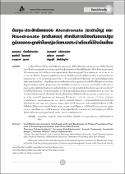บทคัดย่อ
การศึกษานี้วิเคราะห์ต้นทุน-ประสิทธิผลของ Alendronate (ที่เป็นยาชื่อสามัญ) และ Risedronate (ที่เป็นยาต้นแบบ) ในการป้องกันแบบปฐมภูมิของการเกิดกระดูกหักในหญิงวัยหมดประจำเดือนที่มีปัจจัยเสี่ยง ได้แก่ ข้ออักเสบรูห์มาตอยด์, ใช้ Glucocorticoids, มีประวัติบิดา/มารดากระดูกสะโพกหัก, ดื่มสุราและสูบบุหรี่ ใน 8 กลุ่มอายุ (45, 50, 55, 60, 65, 70, 75 และ 80 ปีขึ้นไป) ในมุมมองของผู้ให้บริการสุขภาพ โดยใช้ตัวแบบมาร์คอฟซึ่งประกอบด้วย 9 สถานะสุขภาพ ในกรอบระยะเวลา 10 ปี กำหนดระยะเวลาการให้ยา 5 ปี ความร่วมมือในการใช้ยาร้อยละ 50 และประสิทธิผลภายหลังหยุดยาลดลงแบบเส้นตรง ข้อมูลพื้นฐานของความเสี่ยงต่อการเกิดกระดูกหักและการเสียชีวิตใช้ข้อมูลทางระบาดวิทยา ข้อมูลประสิทธิผลทางคลินิก ต้นทุนและอรรถประโยชน์ได้จากการทบทวนวรรณกรรม และปรับเพิ่มความเสี่ยงของการเกิดกระดูกหักกรณีมีปัจจัยเสี่ยงด้วยค่าความเสี่ยงสัมพัทธ์ระหว่างการมีและไม่มีปัจจัยเสี่ยง โดยคำนวณจากตัวแบบ FRAX® ภายใต้เงื่อนไขค่าคะแนน t ของมวลกระดูกเป็น -2.5 เท่าของส่วนเบี่ยงเบนมาตรฐาน และมีดัชนีมวลกาย 24 กก./ม.2 พบว่า สำหรับหญิงวัยหมดประจำเดือนทั่วไป อัตราส่วนต้นทุนต่อประสิทธิผลส่วนเพิ่ม (Incremental cost-effectiveness ratio, ICER) ของการใช้ Alendronate และ Risedronate มีค่า 801,353 - 7,012,743 บาท และ 1,727,023- 13,967,461 บาทต่อปีสุขภาวะ (quality-adjusted life year, QALY) ตามลำดับ ซึ่งสูงกว่า 3 เท่าของผลิตภัณฑ์มวลรวมในประเทศต่อหัวประชากร (per capita gross domestic product, GDP) การใช้ Alendronate จะมีความคุ้มค่าในหญิงอายุ 75 ปีขึ้นไปซึ่งมีประวัติบิดา/มารดากระดูกสะโพกหัก (ICER, 202,089 บาทต่อปีสุขภาวะ) หรือมีการใช้ Glucocorticoids (ICER, 473,821 บาทต่อปีสุขภาวะ) การใช้ Risedronate จะมีความคุ้มค่าที่ระดับ 3 เท่าของ GDP ต่อหัว สำหรับหญิงอายุ 80 ปีขึ้นไปซึ่งมีประวัติบิดา/มารดากระดูกสะโพกหัก (ICER, 399,114 บาทต่อปีสุขภาวะ)
บทคัดย่อ
This study analyzed the cost effectiveness of Alendronate (generic product) and Risedronate (original product) for the primary prevention of fractures in postmenopausal women with clinical risk factors, including rheumatoid arthritis, long-term use of oral glucocorticoids, a parental history of hip fracture,
high alcohol consumption and current cigarette smoking. A Markov model with nine health states was
applied to estimate total costs and effectiveness for eight age-groups (45, 50, 55, 60, 65, 70, 75 and 80 years
and above) under the healthcare provider perspective. The model used a 10-year time horizon and assumed
the 5-year duration of medication with a linear efficacy reduction after stopping the medication,
and 50% medication adherence. Epidemiological data on natural history of disease, clinical efficacy, cost
and utility data were obtained from literature review. An increased risk of fractures in patients with the
risk factors was adjusted according to the relative risks, which were estimated using the FRAX® model
under the conditions of the bone mass density (BMD) t-score of -2.5SD and body mass index of 24 kg/m2.
The results showed that incremental cost-effectiveness ratio (ICER) of Alendronate and Risedronate for
the primary prevention of fractures in the postmenopausal women who had no clinical risk factors was
equal to 801,353-7,012,743 and 1,727,023-13,967,461 Baht/quality-adjusted life year (QALY), respectively.
The ICER was higher than three times of gross domestic product (GDP) per capita. When clinical risk
factors were considered, the use of Alendronate was cost-effective for women who were 75 years or above
and had the parental history of hip fracture (ICER, 202,089 Baht/QALY) or had the long-term glucocorticoid
use (ICER, 473,821 Baht/QALY). Risedronate was cost-effective for women who were 80 years or
above and had the parental history of hip fracture (ICER, 399,114 Baht/QALY).


